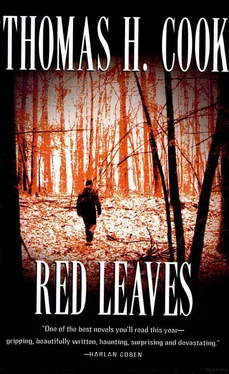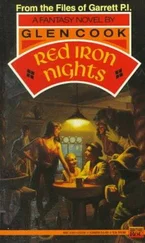And so I forced myself to believe that the phantom suspect against whom the police were building their case had to be thick and burly, with a muscular body and short powerful legs. I wanted him to be a drifter or some visitor from another town. But barring that, I would have settled for anyone, as long as it wasn't Keith.
"How's school?" I asked, then regretted it since it was exactly the kind of inane parental question all teenagers dread.
"It's okay," he answered dully.
"Just okay?"
He plucked a single green bean from the rest of them as if he were playing a solitary game of pick-up-sticks. "It's okay," he repeated, his tone now somewhat sharp, like a felon impatient with interrogation.
"Is there anything we need to know about?" Meredith asked in her usual no-nonsense tone.
"Like what?" Keith asked.
"Like about Amy," Meredith answered. "Are you having any trouble over Amy?"
He drew another green bean from the stack, peered at it as if he thought it might suddenly begin to squirm, then let it drop back onto his plate. "Nobody says anything about it."
"At some point they might," Meredith said.
Keith picked lazily at a red pimple, but said nothing.
"Keith?" Meredith said insistently. "Did you hear me?"
His hand dropped abruptly into his lap. "Yeah, okay, Mom."
He remained silent for the rest of the meal, then excused himself with an exaggerated show of formality and returned to his room.
Meredith and I cleared the table, put the dishes in the dishwasher, and finally returned to the living room where we watched television for a time. Neither of us had much to say, nor did either appear uncomfortable in the silence. There was, after all, nothing to talk about but Keith, and that was a subject that could not be raised without heightening the general level of anxiety, and so we simply avoided it.
A few hours later we went to bed. Meredith read for a while. I knew she was trying to lose herself in a book. That had always been one of her ways of coping. During her mother's illness, she'd read continually, but never more than at her mother's hospital bedside, where she'd devoured book after book in a frantic effort to keep her mother's approaching death at bay. Now she was using the same tactic to keep from dwelling on the grim possibility that our son might be in very deep trouble.
Before she finally turned out the light, it was clear that this time the tactic had failed.
"Do you think Keith should see a counselor?" she asked. She turned toward me and propped her head up in an open palm. "There's one at the college. Stuart Rodenberry. Kids come to him with their troubles. People say he's very good."
"Keith wouldn't talk to a counselor," I said.
"How do you know?"
"He doesn't talk to anybody."
"But everyone wants to reach out, don't you think, to someone?"
"You sound like a counselor, yourself."
"I'm serious, Eric," Meredith said. "Maybe we should think about setting up something with Stuart."
I didn't know what to say, whether counseling was a good or bad idea at this point, and so I simply said nothing.
"Look," Meredith continued, "Stuart's going to be at Dr. Mays's party on Friday. I'll introduce you. If you think Keith might respond to him, we can go from there."
"Fair enough," I said.
With that, Meredith turned out the light.
I lay in the darkness, laboring to fall asleep. But sleep eluded me, and as time crawled forward, my mind drifted back to my first family, which, for all its tragedies, seemed less besieged by trouble. A sister dead at seven, a mother impaled upon a steering wheel, a destitute father living out his days in a modest retirement home, an alcoholic brother—these were, for all their misfortune, not problems unknown to other families. Other families had yet different problems, but those, too, now struck me as common, ordinary. In comparison, Keith's situation was much darker and more sinister. I couldn't shake the image of him slouching out of the shadows and into the house that night, then stealthily trudging up the stairs to face the door when I spoke to him, as if he were afraid to look me in the eye. There was something familiar in the scene, a sense that I'd lived through it before. But try as I did, I couldn't bring the earlier moment back until I suddenly remembered how, on the morning before Jenny's death, Warren had returned from Jenny's room where he'd been more or less stationed by my father to see her through the night. It wasn't a job he'd wanted, and he'd tried to get out of it, but my father had insisted. "You just have to sit by the goddamn bed, Warren," he'd barked, a clear suggestion that any more complex task would have been beyond my brother's limited capacity. Warren had gone to Jennys room at midnight, then returned to his own room when my mother relieved him at six in the morning. He'd looked lost and bedraggled as he trudged down the corridor in the dawning light, his heavy footsteps awakening me so that I'd walked out into the hallway, where I saw him standing, facing the door, just as Keith had, his eyes fixed and unmoving, unable to look at me when I'd asked about Jenny, muttering only, "I'm going to bed," before he opened the door to his room and disappeared inside.
It was the similarity in those two scenes that struck me now, one that went beyond the stark choreography of two teenage boys tired and bedraggled, walking down a hallway, standing rigidly before the closed doors of their rooms. There was a similarity of mood, tone, a sense that these two boys were laboring under similar pressures, both of which had to do, I realized suddenly, with the fate of a little girl.
My anxiety spiked abruptly. I drew myself from the bed, walked out into the corridor, then down the stairs to the unlit kitchen, where I sat in the darkness and thought each scene through again and again, trying to locate some reason beyond the obvious one as to why they so insistently bore down upon me.
It came to me slowly, like the building light of dawn, darkness giving way to gray, then to steadily brightening light. The real similarity was not between the two scenes, but between my brother and my son, the fact, hard though it was for me to admit, that in some sense I thought of both of them as losers in life's cruel lottery, locked in failure and disappointment, members of that despised legion of middle-aged drunks and teenage geeks whose one true power, I thought, must be their unheralded capacity to control their own consuming rage.
He took her hand and led her inside.
Warrens words suddenly called another scene into my mind, Keith summoned by the Giordanos to babysit this daughter they so completely loved. Amy Giordano. Raven-haired, with flawless skin, smart, inquisitive, her future impossibly bright and radiant, destined to be one of life's winners.
Keith's words tore through my brain in a sudden, chilling snarl— Princess Perfect.
In my mind I saw Keith take Amy's hand and lead her inside the house. Could it be, I wondered, that her beauty and giftedness worked on him like an incitement, everything about her an affront, her shining qualities always in his face, goading him from the general sluggishness that would have otherwise stayed his hand.
My own stark whisper broke the air. " Could he have hated her? "
I felt another anxious spike, walked out into the yard, and peered up into the nightbound sky where, in the past, I'd sometimes found comfort in the sheer beauty of the stars. But now each glint of light only reminded me of the mysterious headlights of the car I'd seen that night. Now I imagined a mysterious figure behind the wheel, Keith on the passenger side, then I added a frightful third image, a little girl crouched naked on the floorboard, tied and gagged, whimpering softly if still alive, and, if not, stiff and silent, my son's unlaced tennis shoes pressed against her pale, unmoving face.
Читать дальше












